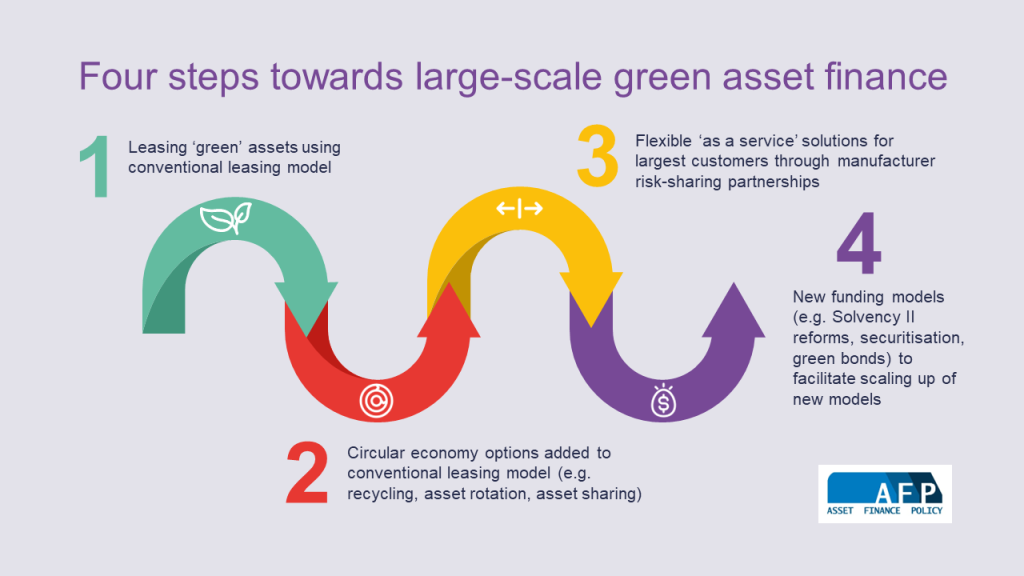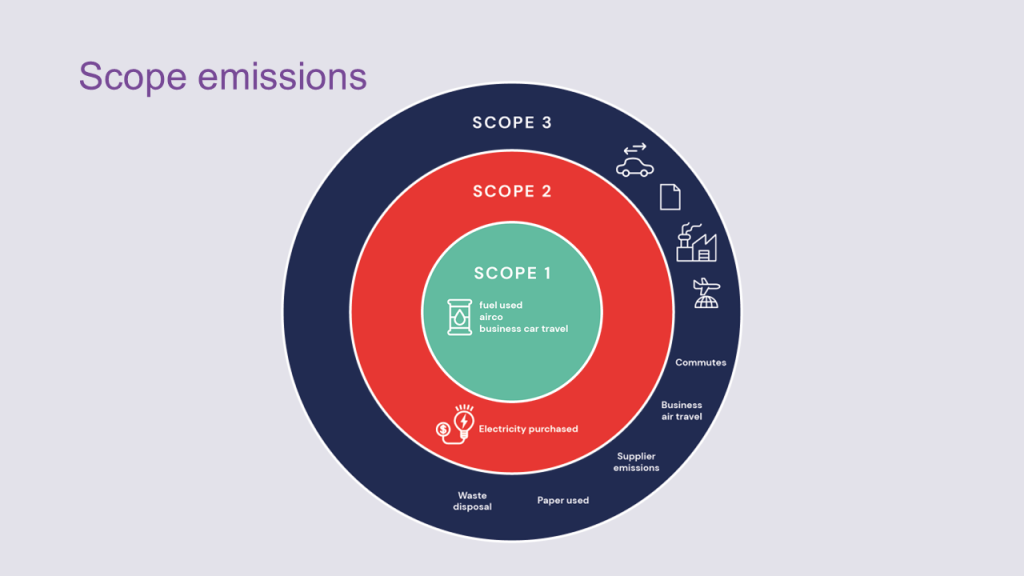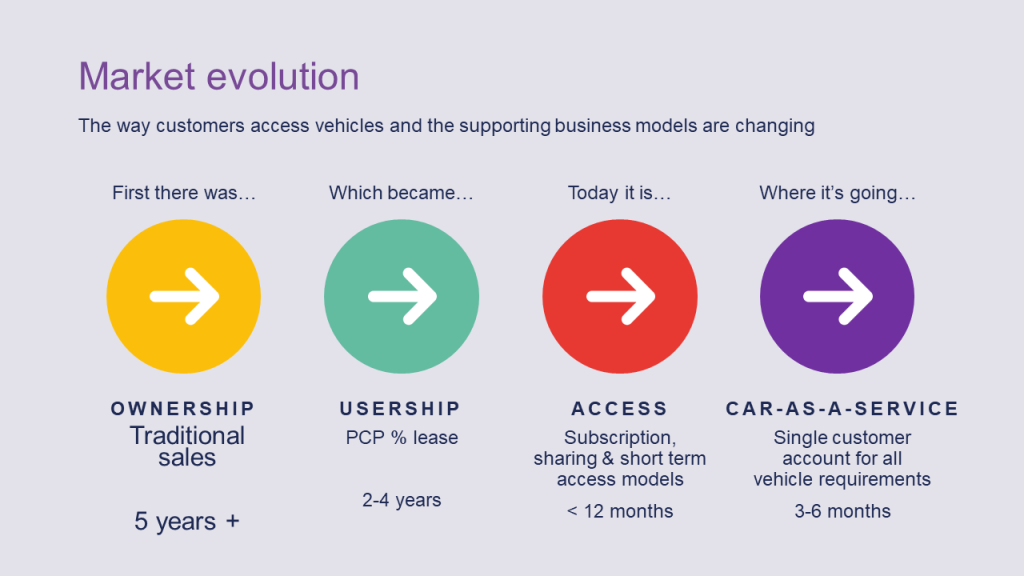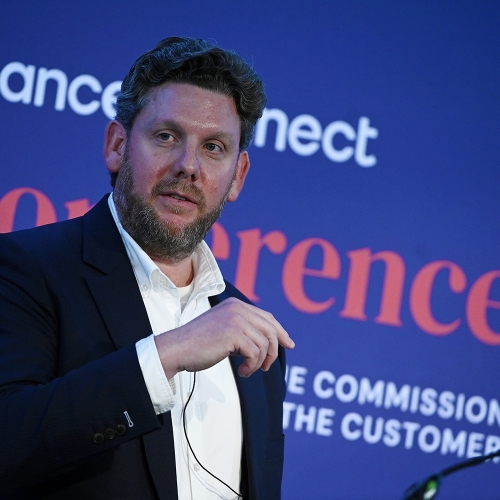Summary
Auto companies are increasingly moving away from the traditional car ownership model to more climate-friendly mobility offerings linked to a company’s sustainability strategies. In a recent session at the AFC Winter Conference, the CEO of Mobilize Financial Services UK, Alice Altemaire, and Asset Finance Connect’s auto finance community leader David Betteley discussed the battle of planet versus profit in the motor finance industry and whether car companies have to sacrifice profitable returns for sustainable strategies or is there a way to have both?
Roadmap to green

Many auto and asset finance businesses have a ‘roadmap to green’ highlighting four steps towards large-scale green asset finance:
- Leasing ‘green’ assets using a conventional leasing model.
- Circular economy options added to the conventional leasing model (e.g. recycling, asset rotation, asset sharing).
- Flexible ‘as a service’ solutions for largest customers through manufacturer risk-sharing partnerships.
- New funding models (e.g. Solvency II reforms, securitisation, green bonds) to facilitate scaling up of new models.
The right level of regulation is required to support, embrace and enable sustainable innovation. Regulators believe that all businesses need to look at their emissions and how they can be reduced, e.g. work with logistics and suppliers in the value chain who must all work towards net zero. From 2019, large UK companies must report their emissions, try to be more efficient and support sustainability.
Scope 1, 2 and 3 emissions

In order to monitor the carbon emissions of the business world, Scope 1, 2 and 3 emissions reporting is now in place:
- Scope 1 emissions – direct emissions from owned or controlled sources, e.g. fuel used, air, and business car travel
- Scope 2 emissions – indirect emissions from the generation of purchased energy e.g. Electricity purchased for use in offices
- Scope 3 emissions– all indirect emissions (not included in Scope 2) that occur in the value chain of the reporting company, including both upstream and downstream emissions, e.g. emissions from products used by the company’s customers
As Scope 3 emissions usually account for more than 70 percent of a business’ carbon footprint, it is crucial that companies tackle these emissions to meet the aims of the Paris Agreement and limit global warming to 1.5°C. However, measuring Scope 3 emissions is a challenge.
There are numerous benefits associated with measuring and reducing Scope 3 emissions, where organisations can:
- assess where the emission hotspots are in their value chain;
- identify resource and energy risks in their supply chain;
- identify which suppliers are leaders and which are laggards in terms of their sustainability performance;
- identify energy efficiency and cost reduction opportunities in their value chain;
- engage suppliers and assist them to implement sustainability initiatives;
- improve the energy efficiency of their products; and
- positively engage with employees to reduce emissions from business travel and employee commuting.
While companies are now recognising the importance of addressing their Scope 3 emissions, action in this area must be scaled up to reach true net zero by 2050.
Mobilize Financial Services started their sustainability journey in 2019 when they subscribed to the SME Climate Hub with a commitment of decreasing their emissions by 50% by 2030 but also to be net zero.
Mobilize successfully monitor their carbon emissions in Scope 1, 2 and 3 and have effectively and efficiently reduced their carbon emissions as well as supporting and influencing their customers and suppliers to be more sustainable.
As Alice Altemaire highlights, changes to reduce Scope 1 and 2 emissions are easy to implement:
- Scope 1: business mileage and emissions – Mobilize have moved to BEVs, with incentive schemes for employers for EVs and chargers.
- Scope 2: office premises and utilities – Mobilize have switched electricity to recycled electricity and energy-saving options at their premises (e.g. solar panels). Alice Altemaire points out that while it is easy to spot problems here, it can be difficult to rectify if the building is leased. However, recent contracts have added a clause whereby premises must be net zero. This ease of transition is further reinforced by Vertu CEO Robert Forrester who highlighted in a recent interview that 50% of Vertu’s power will aim to be off grid in the next 12 months, from LED lighting and solar panels.
- Scope 3: seen as the “most challenging” of the reporting emissions as it is the reporting of the emissions of customers and suppliers. Alice Altemaire believes that businesses must try to influence and support their value chains suppliers to be more sustainable.
Mobilize is aware of reducing their carbon emissions and have invested in Scope 1 and 2 reporting. With this small amount of investment, Mobilize have been able to reduce their emissions and in turn significantly reduce their costs.
With rising energy costs, there is more motivation to save energy which equates to saving money, thus demonstrating that being more efficient leads to costs savings which benefits the business and the planet. Alice Altemaire is a strong advocate that saving the planet ultimately leads to saving money and increased profit: “saving on emissions is saving money and saving costs.”
“Saving the planet is also saving money so there is no excuse not to look at reducing emissions.”
Alice Altemaire
When discussing the emissions of Mobilize’s portfolio, Alice Altemaire highlighted that more emissions are produced in manufacturing electric vehicles (EVs) than ICE cars as the electric vehicle (EV) batteries are being shipped from Asia. Therefore, as Alice notes there is an urgent need to work with the manufacturer to localise battery products and car components to Europe.
Refurbishment and the circular economy
Alice Altemaire is very passionate about promoting the circular economy in the auto industry and refurbishing EVs. Sustainability and circular economy strategies go hand in hand, with cars being the perfect product to be reused, remanufactured and recycled.
“Sustainability and circular economy strategies go hand in hand, with cars being the perfect product to be reused, remanufactured and recycled.”
The circular economy is an increasingly attractive option for automotive players who want to be more sustainable, and shifting to circular manufacturing can open new business models and drive profits.
For example, Renault and Stellantis are both looking at businesses that encapsulate the circular economy. Obviously, decarbonisation plays a role in their plans, but they also have a focus on profits and lowering costs through the circular economy.
The Circular Cars initiative, a collaborative ecosystem-based program led by the World Economic Forum, lists vehicle sharing, smart charging, refurbishing, repurposing, and recycling as effective measures to reduce lifecycle environmental footprints and costs. The project has a clear agenda: to increase the environmental sustainability of mobility.
New mobility services

In the past, car ownership was the predominant model of mobility. However, in recent years with a new younger generation of drivers and increasing urbanisation, the focus has moved away from ownership to usership to mobility as a service (MaaS).
The most popular MaaS models are car sharing and subscription, both providing an alternative to owning or leasing. Most of these MaaS programs offer individuals access to a range of cars with new world tech, with maintenance, roadside assistance and insurance included for an all-inclusive price, lowering the cost and commitment involved in owning a car, and offering a flexible alternative to ownership. People choose subscription primarily for two reasons—either to expand their choices of cars to drive or to reduce the hassle of ownership of a depreciating asset.
Boston Consulting Group1 has highlighted a number of reasons why car subscriptions are gaining consumer interest:
- Buying a car the traditional way is tedious: Many consumers find the conventional car-buying experience to be a hassle and they dislike the sales pressure.
- Ownership is less flexible and can be risky: The commitment is long, whether buying the car outright, financing it or leasing, and the residual value loss and risk is off-putting for many car owners.
- Car ownership is losing its lustre in many parts of the Western world: Ownership for young people is no longer the status symbol or all-consuming aspiration it was just a generation ago. People have a more utilitarian attitude about driving, and studies show that growing numbers of people do not think they need a car to get around.
- Subscriptions are a low-risk way to try out new brands and BEVs: Consumers who might shy away from new brands or battery electric vehicles are more willing to try one out through a subscription.
- Subscriptions are an attractive supplementary option for B2B customers: Subscriptions enable business customers, particularly small and medium-size enterprises, to quickly adjust their fleet size based on demand, and react to changing business conditions.
“In the current market, there is no one-size-fits-all mobility solution.”
However, the vast majority of people are still reluctant to move away from the age-old concept of car ownership, especially to a more expensive albeit more flexible option. As Alice Altemaire confirms, people are reluctant to give up the exclusive use of a car but this generational change will happen over a longer period of time. In the current market, there is no one-size-fits-all mobility solution.
In addition to traditional car owners, subscription and car sharing presents a dilemma for car manufacturers as fewer cars will be needed resulting in less CO2 which is good news for the environment, but for OEMs who want to sell more cars, the idea is not so appealing and profitable.
However, Mobilize’s Alice Altenaire is optimistic highlighting that less new cars were sold for the first time in fifty years in 2021-22, but financial companies, dealers and car manufacturers were still profitable, resulting in a very fruitful year. This shows that you can drive value over volume and is a positive sign when you look at the rising costs from technology, with BEVs being more expensive than ICE vehicles.
Mobility solutions are currently not creating much revenue, but utilisation is the holy grail as it leads to less cars meaning less emissions and a value-added product that provides a full-lifecycle of the car.
Alice Altemaire is aware that, while subscription is still minimal at the moment, it is slowly gaining traction, but as she rightly says, “you need to start the journey somewhere and need to have a forefront approach and the integration of working together (manufacturer, engineer, finance company, supplier) will support the global value chain and the customer.”
Looking to the future
Like Mobilize’s sustainability business model, Alice believes that all organisations need to understand the emissions of their own business and start from that point: reduce Scope 1 and 2 emissions and look at how you can support your customers with Scope 3 and any transition. Sustainable future-proof strategies are needed with products for the future.
In the short-term, such incentives are good for everyone’s wallet and in the long-term they are good for the company’s revenue line, but all sustainable forward-thinking mobility solutions are good for the planet.
Planet and profit can perform successfully side-by-side – green strategies that will help the environment are in unison with company profitability, with many customers now looking at the green and ESG credentials of an organisation to determine if they are worthy of their business.
Alice Altemaire’s resounding message at the AFC Winter Conference was that saving the planet goes hand-in-hand with saving money and increased profitability so everyone must act now.
Note:
1 Boston Consulting Group article – Will Car Subscriptions Revolutionize Auto Sales? – https://www.bcg.com/publications/2021/how-car-subscriptions-impact-auto-sales – July 12, 2021





